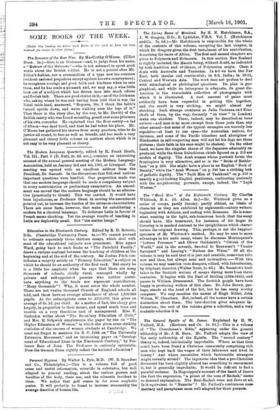The "Good Man" of the Eighteenth Century. By Charles Whittuck,
hi. A. (G. Allen. 6s.)—Mr. Whittuck gives us a series of essays, partly literary, partly ethical, on ideals of character as they are exhibited by eighteenth-century writers, beginning with Addison, and ending with Rousseau. He is some- what wanting in the light, sub-humorous touch that the essay should have. His treatment, for instance. of Sir Roger de Coverley is in marked contrast to the sprightliness which charac- terises the original drawing. This, perhaps, is not the happiest specimen of Mr Whittuck's method. He may be seen to more advantage in his sixth essay, where he discusses Montesquieu'a " Lettres Persanes " and Oliver Goldsmith's "Citizen of the World," and in the seventh, devoted to Rousseau's " Vicaire Savoyard" and Lessing's "Nathan der Weise." Of all the volume it may be said that it is just and sensible, somewhat trite now and then, but always sane and instructive.—With this volume we may mention seas Essayists, edited, with Introduction, by Oliphant Sweaton (Walter Scott, is. 6d.) Mr. Sweaton's book takes in the Scottish writers of essays daring more than three centuries. It begins with the Earl of Stirling (1584-1640), and passes to William Drummond. The Scottish people have been happy in producing writers of this class. Dr. John Brown, per- haps, stands at the head of the list, but he has many worthy compeers. We may mention the names of Hugh Miller, John Wilson, W. Chambers. But, indeed, all the names have a certain distinction about them. The introduction gives adequate in- formation ; the rest of the volume gives a selection, and a very readable selection it is.






































 Previous page
Previous page